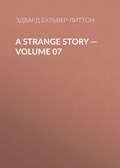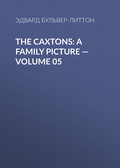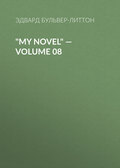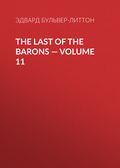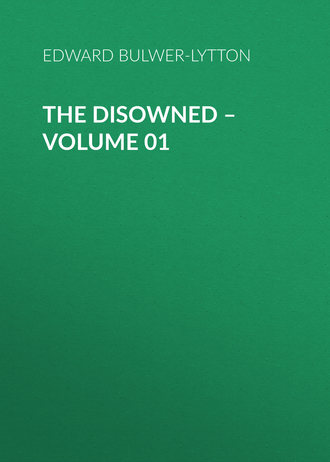
Эдвард Бульвер-Литтон
The Disowned – Volume 01
CHAPTER IV
The letter, madam; have you none for me?
—The Rendezvous.
Provide surgeons.
—Lover's Progress.
Our solitary traveller pursued his way with the light step and gay spirits of youth and health.
"Turn gypsy, indeed!" he said, talking to himself; "there is something better in store for me than that. Ay, I have all the world before me where to choose—not my place of rest. No, many a long year will pass away ere any place of rest will be my choice! I wonder whether I shall find the letter at W–; the letter, the last letter I shall ever have from home but it is no home to me now; and I—I, insulted, reviled, trampled upon, without even a name—well, well, I will earn a still fairer one than that of my forefathers. They shall be proud to own me yet." And with these words the speaker broke off abruptly, with a swelling chest and a flashing eye; and as, an unknown and friendless adventurer, he gazed on the expanded and silent country around him, he felt like Castruccio Castrucani that he could stretch his hands to the east and to the west and exclaim, "Oh, that my power kept pace with my spirit, then should it grasp the corners of the earth!"
The road wound at last from the champaign country, through which it had for some miles extended itself, into a narrow lane, girded on either side by a dead fence. As the youth entered this lane, he was somewhat startled by the abrupt appearance of a horseman, whose steed leaped the hedge so close to our hero as almost to endanger his safety. The rider, a gentleman of about five-and-twenty, pulled up, and in a tone of great courtesy apologized for his inadvertency; the apology was readily admitted, and the horseman rode onwards in the direction of W–.
Trifling as this incident was, the air and mien of the stranger were sufficient to arrest irresistibly the thoughts of the young traveller; and before they had flowed into a fresh channel he found himself in the town and at the door of the inn to which his expedition was bound. He entered the bar; a buxom landlady and a still more buxom daughter were presiding over the spirits of the place.
"You have some boxes and a letter for me, I believe," said the young gentleman to the comely hostess.
"To you, sir!—the name, if you please?"
"To—to—to C– L–," said the youth; "the initials C. L., to be left till called for."
"Yes, sir, we have some luggage; came last night by the van; and a letter besides, sir, to C. L. also."
The daughter lifted her large dark eyes at the handsome stranger, and felt a wonderful curiosity to know what the letter to C. L. could possibly be about; meanwhile mine hostess, raising her hand to a shelf on which stood an Indian slop-basin, the great ornament of the bar at the Golden Fleece, brought from its cavity a well-folded and well- sealed epistle.
"That is it," cried the youth; "show me a private room instantly."
"What can he want a private room for?" thought the landlady's daughter.
"Show the gentleman to the Griffin, No. 4, John Merrylack," said the landlady herself.
With an impatient step the owner of the letter followed a slipshod and marvellously unwashed waiter into No. 4,—a small square asylum for town travellers, country yeomen, and "single gentlemen;" presenting, on the one side, an admirable engraving of the Marquis of Granby, and on the other an equally delightful view of the stable-yard.
Mr. C. L. flung himself on a chair (there were only four chairs in No. 4), watched the waiter out of the room, seized his letter, broke open the seal, and read—yea, reader, you shall read it too—as follows:—
"Enclosed is the sum to which you are entitled; remember, that it is all which you can ever claim at my hands; remember also that you have made the choice which now nothing can persuade me to alter. Be the name you have so long iniquitously borne henceforth and always forgotten; upon that condition you may yet hope from my generosity the future assistance which you must want, but which you could not ask from my affection. Equally by my heart and my reason you are forever DISOWNED."
The letter fell from the reader's hands. He took up the inclosure: it was an order payable in London for 1,000 pounds; to him it seemed like the rental of the Indies.
"Be it so!" he said aloud, and slowly; "be it so! With this will I carve my way: many a name in history was built upon a worse foundation!"
With these words he carefully put up the money, re-read the brief note which enclosed it, tore the latter into pieces, and then, going towards the aforesaid view of the stable-yard, threw open the window and leaned out, apparently in earnest admiration of two pigs which marched gruntingly towards him, one goat regaling himself upon a cabbage, and a broken-winded, emaciated horse, which having just been what the hostler called "rubbed down," was just going to be what the hostler called "fed."
While engaged in this interesting survey, the clatter of hoofs was suddenly heard upon the rough pavement, a bell rang, a dog barked, the pigs grunted, the hostler ran out, and the stranger, whom our hero had before met on the road, trotted into the yard.
It was evident from the obsequiousness of the attendants that the horseman was a personage of no mean importance; and indeed there was something singularly distinguished and highbred in his air and carriage.
"Who can that be?" said the youth, as the horseman, having dismounted, turned towards the door of the inn: the question was readily answered, "There goes pride and poverty!" said the hostler, "Here comes Squire Mordaunt!" said the landlady.
At the farther end of the stable-yard, through a narrow gate, the youth caught a glimpse of the green sward and the springing flowers of a small garden. Wearied with the sameness of No. 4 rather than with his journey, he sauntered towards the said gate, and, seating himself in a small arbour within the garden, surrendered himself to reflection.
The result of this self-conference was a determination to leave the Golden Fleece by the earliest conveyance which went to that great object and emporium of all his plans and thoughts, London. As, full of this resolution and buried in the dream which it conjured up, he was returning with downcast eyes and unheeding steps through the stable-yard, to the delights of No. 4, he was suddenly accosted by a loud and alarmed voice,—
"For God's sake, sir, look out, or—"
The sentence was broken off, the intended warning came too late, our hero staggered back a few steps, and fell, stunned and motionless, against the stable door. Unconsciously he had passed just behind the heels of the stranger's horse, which being by no means in good humour with the clumsy manoeuvres of his shampooer, the hostler, had taken advantage of the opportunity presented to him of working off his irritability, and had consequently inflicted a severe kick upon the right shoulder of Mr. C. L.
The stranger, honoured by the landlady with the name and title of Squire Mordaunt, was in the yard at the moment. He hastened towards the sufferer, who as yet was scarcely sensible, and led him into the house. The surgeon of the village was sent for and appeared. This disciple of Galen, commonly known by the name of Jeremiah Bossolton, was a gentleman considerably more inclined to breadth than length. He was exactly five feet one inch in height, but thick and solid as a milestone; a wig of modern cut, carefully curled and powdered, gave somewhat of a modish and therefore unseemly grace to a solemn eye; a mouth drawn down at the corners; a nose that had something in it exceedingly consequential; eyebrows sage and shaggy; ears large and fiery; and a chin that would have done honour to a mandarin. Now Mr. Jeremiah Bossolton had a certain peculiarity of speech to which I shall find it difficult to do justice. Nature had impressed upon his mind a prodigious love of the grandiloquent; Mr. Bossolton, therefore, disdained the exact language of the vulgar, and built unto himself a lofty fabric of words in which his sense managed very frequently to lose itself. Moreover, upon beginning a sentence of peculiar dignity, Mr. Bossolton was, it must be confessed, sometimes at a loss to conclude it in a period worthy of the commencement; and this caprice of nature which had endowed him with more words than thoughts (necessity is, indeed, the mother of invention) drove him into a very ingenious method of remedying the deficiency; this was simply the plan of repeating the sense by inverting the sentence.
"How long a period of time," said Mr. Bossolton, "has elapsed since this deeply-to-be-regretted and seriously-to-be-investigated accident occurred?"
"Not many minutes," said Mordaunt; "make no further delay, I beseech you, but examine the arm; it is not broken, I trust?"
"In this world, Mr. Mordaunt," said the practitioner, bowing very low, for the person he addressed was of the most ancient lineage in the county, "in this world, Mr. Mordaunt, even at the earliest period of civilization, delay in matters of judgment has ever been considered of such vital importance, and—and such important vitality, that we find it inculcated in the proverbs of the Greeks and the sayings of the Chaldeans as a principle of the most expedient utility, and—and—the most useful expediency!"
"Mr. Bossolton," said Mordaunt, in a tone of remarkable and even artificial softness and civility, "have the kindness immediately to examine this gentleman's bruises."
Mr. Bossolton looked up to the calm but haughty face of the speaker, and without a moment's hesitation proceeded to handle the arm, which was already stripped for his survey.
"It frequently occurs," said Mr. Bossolton, "in the course of my profession, that the forcible, sudden, and vehement application of any hard substance, like the hoof of a quadruped, to the soft, tender, and carniferous parts of the human frame, such as the arm, occasions a pain—a pang, I should rather say—of the intensest acuteness, and— and of the acutest intensity."
"Pray, Mr. Bossolton, is the bone broken?" asked Mordaunt.
By this time the patient, who had been hitherto in that languor which extreme pain always produces at first, especially on young frames, was sufficiently recovered to mark and reply to the kind solicitude of the last speaker: "I thank you, sir," said he with a smile, "for your anxiety, but I feel that the bone is not broken; the muscles are a little hurt, that is all."
"Young gentleman," said Mr. Bossolton, "you must permit me to say that they who have all their lives been employed in the pursuit, and the investigation, and the analysis of certain studies are in general better acquainted with those studies than they who have neither given them any importance of consideration—nor—nor any consideration of importance. Establishing this as my hypothesis, I shall now proceed to—"
"Apply immediate remedies, if you please, Mr. Bossolton," interrupted Mr. Mordaunt, in that sweet and honeyed tone which somehow or other always silenced even the garrulous practitioner.
Driven into taciturnity, Mr. Bossolton again inspected the arm, and proceeded to urge the application of liniments and bandages, which he promised to prepare with the most solicitudinous despatch and the most despatchful solicitude.
CHAPTER V
Your name, Sir!
Ha! my name, you say—my name?
'T is well—my name—is—nay, I must consider.
—Pedrillo.
This accident occasioned a delay of some days in the plans of the young gentleman, for whom we trust very soon, both for our own convenience and that of our reader, to find a fitting appellation.
Mr. Mordaunt, after seeing every attention paid to him both surgical and hospitable, took his departure with a promise to call the next day; leaving behind him a strong impression of curiosity and interest to serve our hero as some mental occupation until his return. The bonny landlady came up in a new cap, with blue ribbons, in the course of the evening, to pay a visit of inquiry to the handsome patient, who was removed from the Griffin, No. 4, to the Dragon, No. 8,—a room whose merits were exactly in proportion to its number, namely, twice as great as those of No. 4.
"Well, sir," said Mrs. Taptape, with a courtesy, "I trust you find yourself better."
"At this moment I do," said the gallant youth, with a significant air.
"Hem," quoth the landlady.
A pause ensued. In spite of the compliment, a certain suspicion suddenly darted across the mind of the hostess. Strong as are the prepossessions of the sex, those of the profession are much stronger.
"Honest folk," thought the landlady, "don't travel with their initials only; the last 'Whitehall Evening' was full of shocking accounts of swindlers and cheats; and I gave nine pounds odd shillings for the silver teapot John has brought him up,—as if the delft one was not good enough for a foot traveller!"
Pursuing these ideas, Mrs. Taptape, looking bashfully down, said,—
"By the by, sir; Mr. Bossolton asked me what name he should put down in his book for the medicines; what would you please me to say, sir?"
"Mr. who?" said the youth, elevating his eyebrows.
"Mr. Bossolton, sir, the apothecary."
"Oh! Bossolton! very odd name that,—not near so pretty as—dear me, what a beautiful cap that is of yours!" said the young gentleman.
"Lord, sir, do you think so? The ribbon is pretty enough; but—but, as I was saying, what name shall I tell Mr. Bossolton to put in his book?" "This," thought Mrs. Taptape, "is coming to the point."
"Well!" said the youth, slowly, and as if in a profound reverie, "well, Bossolton is certainly the most singular name I ever heard; he does right to put it in a book: it is quite a curiosity! is he clever?"
"Very, sir," said the landlady, somewhat sharply; "but it is your name, not his, that he wishes to put into his book."
"Mine?" said the youth, who appeared to have been seeking to gain time in order to answer a query which most men find requires very little deliberation, "mine, you say; my name is Linden—Clarence Linden—you understand?"
"What a pretty name!" thought the landlady's daughter, who was listening at the keyhole; "but how could he admire that odious cap of Ma's!"
"And, now, landlady, I wish you would send up my boxes; and get me a newspaper, if you please."
"Yes, sir," said the landlady, and she rose to retire.
"I do not think," said the youth to himself, "that I could have hit on a prettier name, and so novel a one too!—Clarence Linden,—why, if I were that pretty girl at the bar I could fall in love with the very words. Shakspeare was quite wrong when he said,—
'A rose by any other name would smell as sweet.'"
"A rose by any name would not smell as sweet; if a rose's name was Jeremiah Bossolton, for instance, it would not, to my nerves at least, smell of anything but an apothecary's shop!"
When Mordaunt called the next morning, he found Clarence much better, and carelessly turning over various books, part of the contents of the luggage superscribed C. L. A book of whatever description was among the few companions for whom Mordaunt had neither fastidiousness nor reserve; and the sympathy of taste between him and the sufferer gave rise to a conversation less cold and commonplace than it might otherwise have been. And when Mordaunt, after a stay of some length, rose to depart, he pressed Linden to return his visit before he left that part of the country; his place, he added, was only about five miles distant from W–. Linden, greatly interested in his visitor, was not slow in accepting the invitation, and, perhaps for the first time in his life, Mordaunt was shaking hands with a stranger he had only known two days.
CHAPTER VI
While yet a child, and long before his time,
He had perceived the presence and the power
Of greatness.
. . . . .
But eagerly he read, and read again.
. . . . .
Yet still uppermost
Nature was at his heart, as if he felt,
Though yet he knew not how, a wasting power
In all things that from her sweet influence
Might seek to wean him. Therefore with her hues,
Her forms, and with the spirit of her forms,
He clothed the nakedness of austere truth.
WORDSWORTH.
Algernon Mordaunt was the last son of an old and honourable race, which had centuries back numbered princes in its line. His parents had had many children, but all (save Algernon, the youngest) died in their infancy. His mother perished in giving him birth. Constitutional infirmity and the care of mercenary nurses contributed to render Algernon a weakly and delicate child: hence came a taste for loneliness and a passion for study; and from these sprung, on the one hand, the fastidiousness and reserve which render us apparently unamiable, and, on the other, the loftiness of spirit and the kindness of heart which are the best and earliest gifts of literature, and more than counterbalance our deficiencies in the "minor morals" due to society by their tendency to increase our attention to the greater ones belonging to mankind. Mr. Mordaunt was a man of luxurious habits and gambling propensities: wedded to London, he left the house of his ancestors to moulder into desertion and decay; but to this home Algernon was constantly consigned during his vacations from school; and its solitude and cheerlessness gave to a disposition naturally melancholy and thoughtful those colours which subsequent events were calculated to deepen, not efface.
Truth obliges us to state, despite our partiality to Mordaunt, that, when he left his school after a residence of six years, it was with the bitter distinction of having been the most unpopular boy in it. Why, nobody could exactly explain, for his severest enemies could not accuse him of ill-nature, cowardice, or avarice, and these make the three capital offences of a school-boy; but Algernon Mordaunt had already acquired the knowledge of himself, and could explain the cause, though with a bitter and swelling heart. His ill health, his long residence at home, his unfriended and almost orphan situation, his early habits of solitude and reserve, all these, so calculated to make the spirit shrink within itself, made him, on his entrance at school, if not unsocial, appear so: this was the primary reason of his unpopularity; the second was that he perceived, for he was sensitive (and consequently acute) to the extreme, the misfortune of his manner, and in his wish to rectify it, it became doubly unprepossessing; to reserve, it now added embarrassment, to coldness, gloom; and the pain he felt in addressing or being addressed by another was naturally and necessarily reciprocal, for the effects of sympathy are nowhere so wonderful, yet so invisible, as in the manners.
By degrees he shunned the intercourse which had for him nothing but distress, and his volatile acquaintances were perhaps the first to set him the example. Often in his solitary walks he stopped afar off to gaze upon the sports which none ever solicited him to share; and as the shout of laughter and of happy hearts came, peal after peal, upon his ear, he turned enviously, yet not malignantly away, with tears, which not all his pride could curb, and muttered to himself, "And these, these hate me!"
There are two feelings common to all high or affectionate natures,– that of extreme susceptibility to opinion and that of extreme bitterness at its injustice. These feelings were Mordaunt's: but the keen edge which one blow injures, the repetition blunts; and by little and little, Algernon became not only accustomed, but, as he persuaded himself, indifferent, to his want of popularity; his step grew more lofty, and his address more collected, and that which was once diffidence gradually hardened into pride.
His residence at the University was neither without honour nor profit. A college life was then, as now, either the most retired or the most social of all others; we need scarcely say which it was to Mordaunt, but his was the age when solitude is desirable, and when the closet forms the mind better than the world. Driven upon itself, his intellect became inquiring and its resources profound; admitted to their inmost recesses, he revelled among the treasures of ancient lore, and in his dreams of the Nymph and Naiad, or his researches after truth in the deep wells of the Stagyrite or the golden fountains of Plato, he forgot the loneliness of his lot and exhausted the hoarded enthusiasm of his soul.
But his mind, rather thoughtful than imaginative, found no idol like "Divine Philosophy." It delighted to plunge itself into the mazes of metaphysical investigation; to trace the springs of the intellect; to connect the arcana of the universe; to descend into the darkest caverns, or to wind through the minutest mysteries of Nature, and rise, step by step, to that arduous elevation on which Thought stands dizzy and confused, looking beneath upon a clouded earth, and above upon an unfathomable heaven.
Rarely wandering from his chamber, known personally to few and intimately by none, Algernon yet left behind him at the University the most remarkable reputation of his day. He had obtained some of the highest of academical honours, and by that proverbial process of vulgar minds which ever frames the magnificent from the unknown, the seclusion in which he lived and the recondite nature of his favourite pursuits attached to his name a still greater celebrity and interest than all the orthodox and regular dignities he had acquired. There are few men who do not console themselves for not being generally loved, if they can reasonably hope that they are generally esteemed. Mordaunt had now grown reconciled to himself and to his kind. He had opened to his interest a world in his own breast, and it consoled him for his mortification in the world without. But, better than this, his habits as well as studies had strengthened the principles and confirmed the nobility of his mind. He was not, it is true, more kind, more benevolent, more upright than before; but those virtues now emanated from principle, not emotion: and principle to the mind is what a free constitution is to a people; without that principle or that free constitution, the one may be for the moment as good, the other as happy; but we cannot tell how long the goodness and the happiness will continue.
On leaving the University, his father sent for him to London. He stayed there a short time, and mingled partially in its festivities; but the pleasures of English dissipation have for a century been the same, heartless without gayety, and dull without refinement. Nor could Mordaunt, the most fastidious, yet warm-hearted of human beings, reconcile either his tastes or his affections to the cold insipidities of patrician society. His father's habits and evident distresses deepened his disgust to his situation; for the habits were incurable and the distresses increasing; and nothing but a circumstance which Mordaunt did not then understand prevented the final sale of an estate already little better than a pompons incumbrance.
It was therefore with the half painful, half pleasurable sensation with which we avoid contemplating a ruin we cannot prevent that Mordaunt set out upon that Continental tour deemed then so necessary a part of education. His father, on taking leave of him, seemed deeply affected. "Go, my son," said he, "may God bless you, and not punish me too severely. I have wronged you deeply, and I cannot bear to look upon your face."
To these words Algernon attached a general, but they cloaked a peculiar, meaning: in three years, he returned to England; his father had been dead some months, and the signification of his parting address was already deciphered,—but of this hereafter.
In his travels Mordaunt encountered an Englishman whose name I will not yet mention: a person of great reputed wealth; a merchant, yet a man of pleasure; a voluptuary in life, yet a saint in reputation; or, to abstain from the antithetical analysis of a character which will not be corporeally presented to the reader till our tale is considerably advanced, one who drew from nature a singular combination of shrewd but false conclusions, and a peculiar philosophy, destined hereafter to contrast the colours and prove the practical utility of that which was espoused by Mordaunt.



